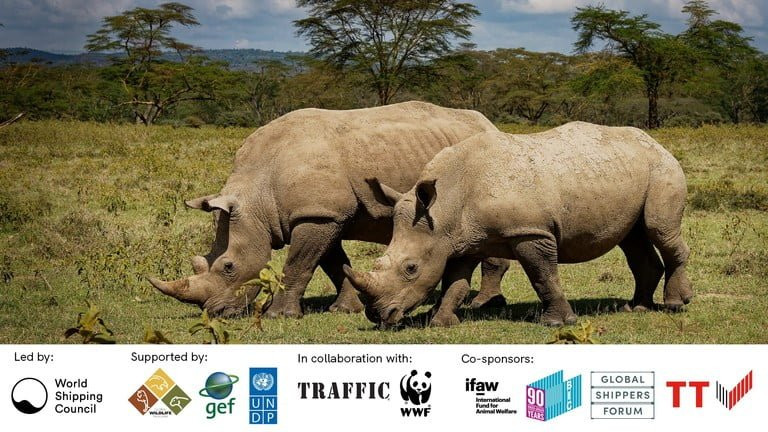Wildlife crime continues to pose a significant threat to biodiversity, local and national economies, as well as national and international security.
The illicit trafficking of wildlife not only endangers countless species but also undermines the stability of ecosystems and jeopardizes the livelihoods of communities worldwide. Recognising the severity of this issue, ten leading organisations have joined forces to combat illegal wildlife trafficking through increasing awareness and vigilance across global supply chains.
READ: Flying fish from Japan: American Airlines Cargo hit a new record
Maritime traffic, in particular, remains vulnerable to the trafficking of illegal goods. With the vast volume of trade carried by sea, the demand for faster, just-in-time deliveries and the increasing complexity of intermodal supply chains, criminals increasingly exploit weaknesses in global maritime supply chains to traffic contraband items.
Stepping up the fight against illegal wildlife trafficking, ten international organisations have joined forces in an initiative led by the World Shipping Council, supported by United Nations Development Program, the Global Environment Facility, and the Global Wildlife Program, in collaboration with TRAFFIC and WWF, and co-sponsored by BIC, Global Shippers Forum, the International Fund for Animal Welfare and TT Club. Together, they have produced practical guidelines for all supply chain participants, with advice on measures to take, questions to ask to help identify criminal wildlife trade, and guidance on reporting suspicious activities. An accompanying “Red Flags” document serves as a daily reference for all individuals involved in the supply chain.
Combatting illegal wildlife trafficking is a shared responsibility that requires collaboration across international containerized supply chains. All parties involved, especially consolidators and those receiving goods for packing or carriage, must take proactive steps to prevent the shipment of illegal wildlife. This includes verifying the legitimacy of cargoes, properly sealing shipments, conducting risk assessments, and promptly alerting national authorities to suspicious activities, as appropriate.
The Joint Industry Guidelines for Combatting Illegal Wildlife Trafficking are designed to support and further promote existing International Maritime Organisation (IMO) guidelines by providing specific and actionable guidance to private sector stakeholders, and the IMO was kept informed through the development process. The joint industry guidelines have been submitted to the IMO for additional awareness and action.
Illegal wildlife trafficking is not only decimating endangered species worldwide but also fuelling organized crime and threatening global security. The coalition’s joint effort underscores the shared responsibility of all stakeholders in combatting illegal wildlife trafficking. By uniting their expertise and resources, these organisations demonstrate their commitment to protecting wildlife and promoting sustainable trade practices.
“We recognize the critical role that the maritime industry plays in combatting illegal wildlife trafficking. By working together to increase awareness across the supply chain of how to spot and address this criminal activity, we can prevent the exploitation of global maritime supply chains for criminal activities and protect endangered species worldwide,” says John Butler, President & CEO of the World Shipping Council.
“Wildlife crime often converges with transnational organized crime, such as trafficking in illicit drugs and arms. The Joint Industry Guidelines for Combatting Illegal Wildlife Trafficking aim to support stakeholders to address wildlife trafficking through their organizational processes. WWF is committed to continue fostering strong public-private partnerships through collective initiatives like this, to disrupt illegal trade and to disincentivize wildlife traffickers using the maritime sector supply chain to traffic illicit goods,” says Dr Margaret Kinnaird, Wildlife Practice Lead of WWF.
READ: Cargolux Airlines transports two lions rescued from Ukraine
“The illegal trade of wildlife across our oceans is immense, overlooked, and often under-reported. Given its scale and vulnerability, it is critical that maritime traffic be central to our collective efforts to mitigate the illegal trade in wildlife. The creation of these guidelines is a fundamental first step in shining a spotlight on this part of the supply chain, giving us the building blocks for a solution which positively impacts animals across the globe. When we protect biodiversity, we protect ourselves, and today, we are one step closer to making this a reality,” said Azzedine Downes, President and CEO of the International Fund for Animal Welfare (IFAW).
“It’s estimated that 72-90% of illegally trafficked wildlife, including live animals, animal products, plants, and timber, is smuggled via the shipping industry, so the sector holds a responsibility to rise against transnational organised crime. By taking action with these resources, the sector will have far- reaching positive impacts for conversation and biodiversity growth at the same time as protecting livelihoods of local communities. “ Philippa Dyson, Monitoring, Evaluation and Learning Manager at TRAFFIC.





